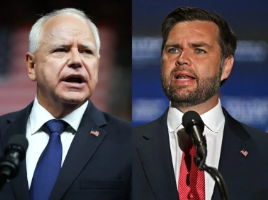Vice Presidential Debate was Unhelpfully and Unsettling Civil

by Lilah Boig ’26
After the piercing presidential debates this year, the recent vice presidential date left many viewers feeling like they needed more. It was held on October 1 between JD Vance and Tim Waltz.
It began with a timely question about what they would do about the attacks in the Middle East. Waltz stated he wants to make sure Israel can defend itself but also help the Gaza humanitarian crisis. While this statement does appeal to the older and centrist voters, it is negative in the eyes of the Gen Z progressive voters that the democratic ticket needs. Vance’s response was that poor leadership [Biden] had caused all of this to happen. Neither candidate stated policy or their ideas for action, which unfortunately is a common theme in this debate.
At more controversial points such as about immigration, there were finally discussions on the policy as Waltz argued against Vance’s stance that the current weak border policies were the biggest problems Americans faced today. Waltz brought up the border bill Trump had recently turned down, but also told Vance he “believed [Vance] wanted to help.” Numerous times in the debate Waltz and Vance agreed with each other’s points like this. While this type of civility is refreshing, it’s completely unrealistic when looking at their actual policy differences.
Vance took the momentum during the economy question, bashing Harris for allowing in an influx of immigrants he falsely claims are driving inflation. He put an emphasis on working-class life and brought it back to growing up with a single mother who struggled with putting food on the table. This appealed to the middle-class watchers who are the most affected by inflation.
Waltz appeared passionate when the debate turned to the topic of abortion. He criticized Trump for adding three conservative judges to the Supreme Court Judges which resulted in the overturning of Roe V. Wade, and Waltz was clear about his stance being “pro-women” and “pro-freedom”.
Left-leaning views on abortion are key for the Democratic campaign to win this election. Still, a lot of both candidates’ debate points here were slandering the other’s nominee for president. This took away from the debate atmosphere as they focused on people who were not even there and not on the questions that watchers wanted to know their opinions on.
Later in the debate, they were asked about their qualifications, which brought up issues from the past. Waltz stammered around the questioning over his incorrect statement that he was in China during Tiananmen Square. He explained he misspoke and is “a knucklehead sometimes.” Vance blamed his past infamous comments about Donald Trump, on “fake media” getting to him. The constant focus on defending themselves does not allow for information about what they can bring to the Office. While some values were mentioned in other areas of the debate, not giving clear values here paints these candidates as unspecial and just more politicians who have claimed fake stuff.
In one telling moment, Vance refused to say that Trump lost the 2020 election, and Waltz interrupted to say that was a “damning non-answer answer.” In subsequent interviews, Vance has continued to sidestep answering the question of whether Trump lost, despite there being no evidence of election fraud.
Nonetheless, the Vice Presidential debate is a more niche piece of politics and it’s unlikely “undecided voters” watched it to decide anything based on the vice president. Regarding the election this in reality is inconsequential, but for those interested, it was a lackluster debate from both parties and shows how the drama of politics tends to overshadow what’s really important.